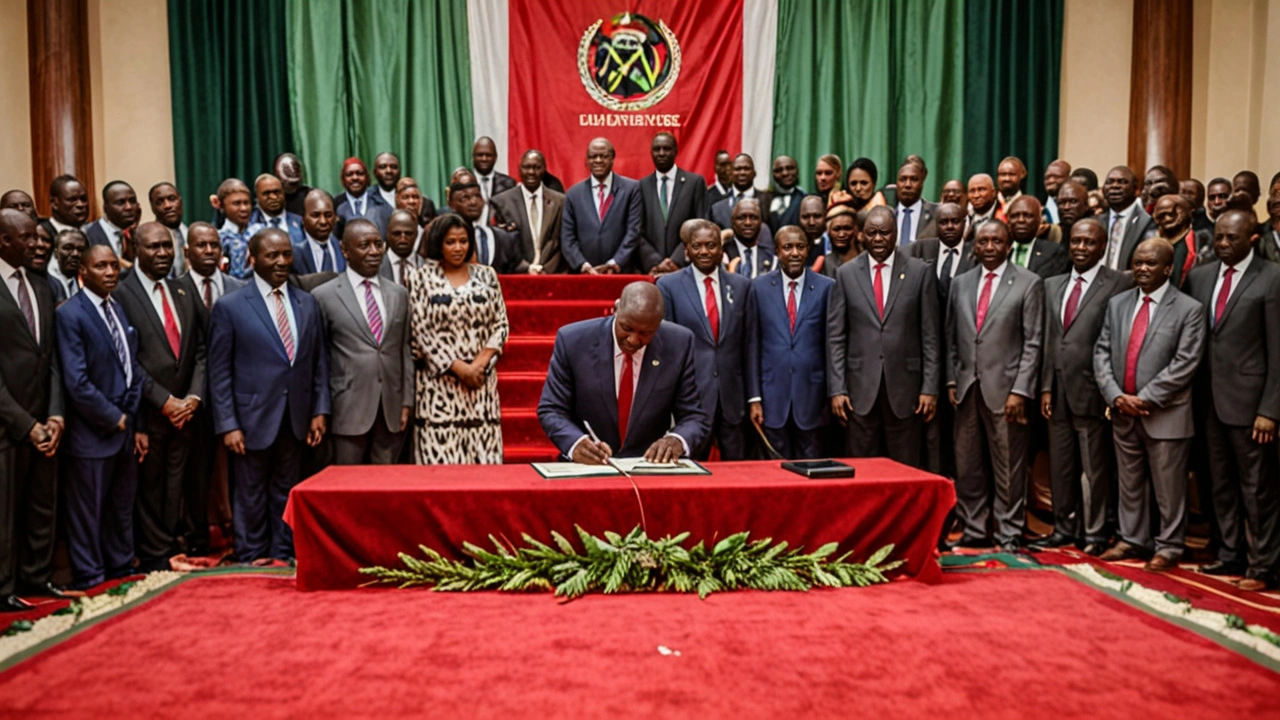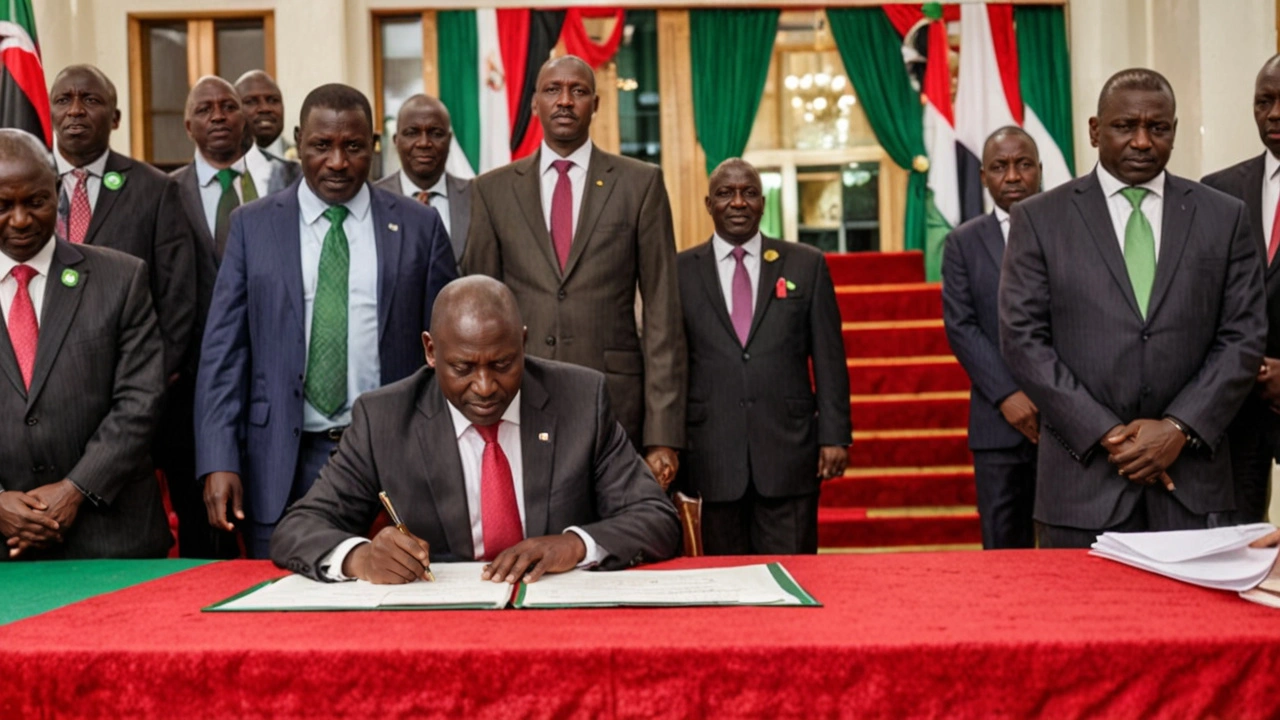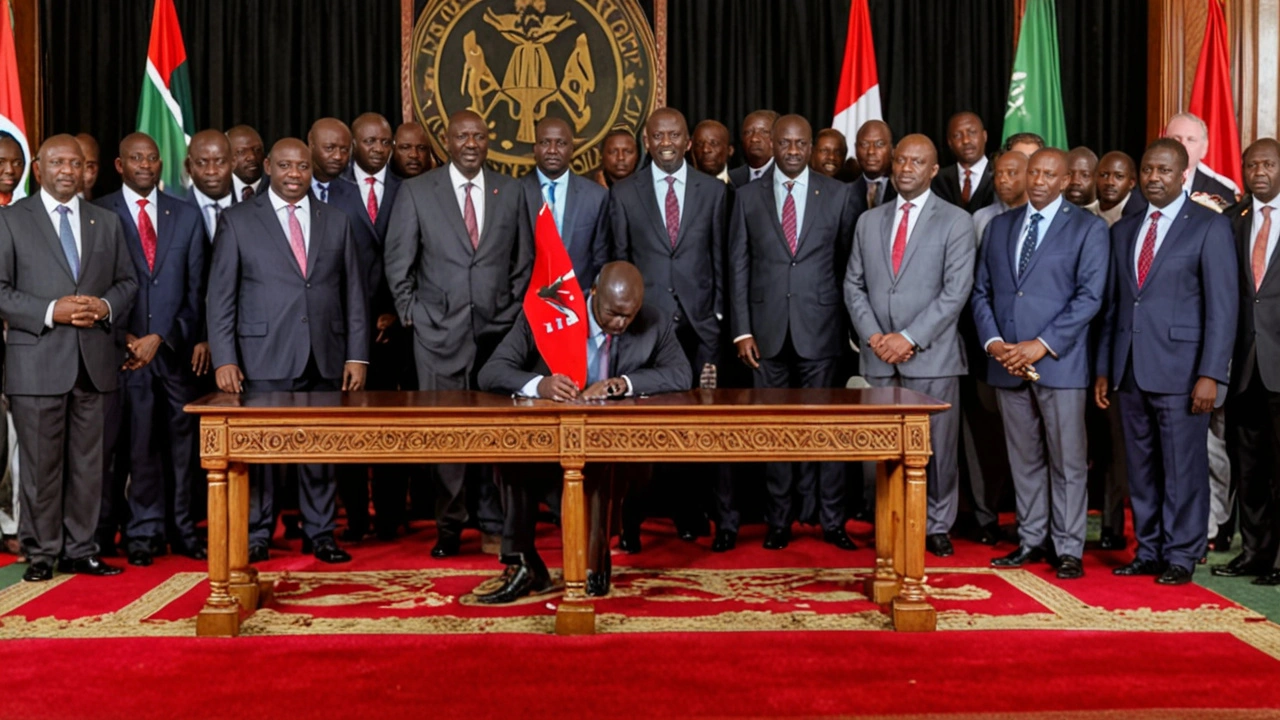Kenya Charts New Course with Fresh Electoral Commission as President Ruto Signs Key IEBC Reform Bill

Kenya Charts New Course with Fresh Electoral Commission as President Ruto Signs Key IEBC Reform Bill
In a momentous event aimed at addressing longstanding electoral issues, President William Ruto signed into law the Independent Electoral and Boundaries Commission (IEBC) Amendment Bill of 2024 on July 9. This significant legislation marks a crucial step in reconstituting the country’s beleaguered electoral body. The bill’s passage signifies a collaborative triumph for the Kenya Kwanza government and the Azimio-One Kenya coalition, reflecting the unity underscored by the National Dialogue Committee (NADCO). As the country prepares for a thorough overhaul of its electoral commission, the new Act promises to instill greater trust and confidence among the Kenyan populace.
Historical Context and Legislative Journey
The journey toward the enactment of the IEBC Amendment Bill began against a backdrop of growing public disenchantment with the electoral process. Previously, the IEBC had come under intense scrutiny following the retirement of its officials, including Chairperson Wafula Chebukati. Claims of electoral fraud and malpractices had marred successive elections, fueling calls for comprehensive reforms. Pressure from opposition parties and civil society groups intensified the demand for an unequivocal reconstitution of the electoral body.
This widespread discontentment led to the formation of NADCO, which diligently canvassed for reforms. Their recommendations culminated in the drafting of the IEBC Bill, a move seen as pivotal for restoring public faith in the electoral system. The bill outlined reforms, including expanding the selection panel for IEBC commissioners from seven to nine members, ensuring broader representation and diversity. Notable entities such as the Parliamentary Service Commission, the Law Society of Kenya, the Inter-Religious Council of Kenya, and political parties now have a say in the nomination process.
Details of the Amendment Bill
The IEBC Amendment Bill constitutes several key changes aimed at building a more representative and transparent electoral body. By increasing the selection panel to nine members, the legislation ensures a more inclusive process. Members will be nominated from a diverse array of organizations, reflecting society's broader spectrum. This expansion also mitigates the risk of partiality and biases that have historically plagued the commission.
According to the newly signed bill, the nomination process will kick off with President Ruto appointing the nine-member selection panel. Once constituted, the panel will invite applications from aspiring commissioners, conduct an open and merit-based shortlisting process, and hold public interviews to enhance transparency. Following these steps, the shortlist of candidates will be forwarded to the President, who will then submit the nominees to the National Assembly for final approval.

Significance for Kenya’s Electoral Landscape
The reformist approach embodied in the IEBC Amendment Bill underscores a robust effort to address historical injustices within Kenya’s electoral framework. By incorporating more inclusive and transparent processes, the new Act aims to enhance public trust in the IEBC. For years, the credibility of Kenya's electoral commission has been a pivotal concern, impacting everything from election outcomes to political stability. The new legislation seeks to rectify these systemic issues, ensuring fair and credible elections in the future.
Moreover, the act of reconstituting the IEBC is not just a procedural change but a symbolic gesture of renewal and commitment to justice. The inclusivity embedded within the selection process signifies a break from past practices that were often critiqued for being opaque and exclusionary. This transparency is expected to foster confidence among voters and political stakeholders alike, potentially changing the dynamics of future elections.
Political and Social Reactions
Since the signing of the bill, reactions have been varied but largely hopeful. Political analysts have hailed it as a landmark achievement for President Ruto’s administration, noting that it aligns with his campaign promises of fostering democratic tenets and accountability. Civil society organizations and opposition parties have also expressed cautious optimism. They acknowledge the potential for the new measures to bring about much-needed reforms but emphasize the importance of vigilant monitoring to ensure proper implementation.
On the ground, the general populace appears to be cautiously optimistic. While there is a sense of relief that long-standing demands are being addressed, many Kenyans are adopting a wait-and-see approach. Past electoral reforms have often been undermined by poor implementation, and citizens are keen to see whether the legislative changes will translate into real-world improvements in the electoral landscape.

Implementation Challenges and Future Outlook
While the enactment of the IEBC Amendment Bill is undoubtedly a significant milestone, several challenges lie ahead in its implementation. Establishing a new selection panel, managing public expectations, and navigating political dynamics will all be pivotal to the bill’s success. There is a palpable necessity for rigorous oversight and transparency throughout the process to prevent a repeat of past mistakes.
A pertinent aspect will be the role of civil society and media in holding the government accountable. Transparency in the selection process and subsequent activities of the IEBC will need to be diligently observed and reported. Citizen engagement and feedback will also be critical in refining the process and ensuring comprehensive electoral reforms.
Looking forward, the reconstituted IEBC is anticipated to set new benchmarks for electoral integrity and fairness in Kenya. By fostering a culture of accountability and inclusivity, the new commission has the potential to change the narrative around elections in the country. Suppose the bill’s provisions are implemented with fidelity and transparency. In that case, Kenya stands to emerge as a regional exemplar in electoral governance, inspiring neighboring countries grappling with similar issues.
In conclusion, the signing of the IEBC Amendment Bill by President William Ruto marks a new chapter in Kenya’s democratic journey. This comprehensive reform aims to rebuild trust in the electoral process, ensuring that future elections reflect the true will of the people. As Kenya embarks on this new path, the importance of vigilance, transparency, and inclusivity cannot be overstated. The journey toward a fully reformed IEBC is just beginning, and the onus is on all stakeholders to nurture these changes for the benefit of the nation.